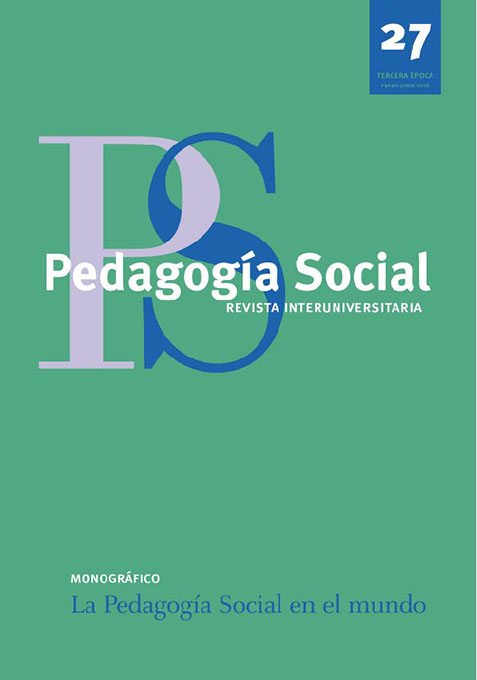Educação social no Japão
DOI:
https://doi.org/10.7179/PSRI_2016.27.12Palavras-chave:
Educação Social, Aprendizagem ao longo da vida, Kominkhan (centro de educação comunitária) desenvolvimento comunitário, auto-educação, socialização da educação, sozialpädagogik.Resumo
O conceito semelhante à pedagogia social é “a educação social” no Japão. O objetivo deste artigo é esclarecer a realidade da educação social no Japão, através da discussão sobre a história, teoria, me todologias, profissionalização e prática de educação social no Japão. A meta da educação social é alcançar a autorealização individual por qualquer organização sistemática da educação formal e educação nãofor mal, ou acumulação de educação nãoformal, e, ao mesmo tempo, contribuir para uma sociedade melhor. Isso significa, também, a realização de um capital social em uma comunidade. A realização de uma sociedade melhor e autorealização individual são a própria filosofia de bem-estar social. Embora as formas de abor dagem da educação social e bem-estar social sejam diferentes, podese dizer que elas compartilham a mesma filosofia.
Nos últimos anos, têm havido tentativas de integrar educação e bem-estar social e desenvolver práticas estruturalmente consolidadas em algumas comunidades. Administrativamente, é um desafio para regiona lismo burocrático e o problema está com a disposição do pessoal que está no comando dessas práticas. É possível criar uma prática de Educação Social e Bem-estar nas comunidades através da atribuição de equi pes que sejam responsáveis pela educação social e equipes que estejam encarregadas do bem-estar social. Ambos os grupos irão cooperar e trabalhar em conjunto. A prática realizada pela cooperação entre a edu cação e o bem-estar social vai levar ao desenvolvimento da comunidade e também a estrutura de gover nança comunitária.
No futuro, é necessário desenvolver comunidades com a finalidade de realização de uma sociedade me lhor através das práticas de bem-estar social e educação. A estrutura de Educação Social e Bem-estar baseada em comunidades sugere a direção da educação social no Japão no futuro.
Downloads
Referências
Kobayashi, S. (2008). Modern Social Education: Lifelong Learning and Social Education Personnel. Kurein: Press.
Kobayashi , S., Kataoka, R., & Hirakawa, K. (Eds.). (2014) The Introduction to Lifelong Learning. Eidell: Kenkyusho. Matsuda , T. (2004) Foundation of Social Education in Modern Japan. Kyushu: University Press.
Matsuda, T. (2007). Reexamination of Community Values in Social Education: Through Reinterpretation of the Con- cept of Social Education. The Japanese Journal of Educational research. Vol.74, No.4, December, 518-529.
Matsuda , T. (Ed.). (2015) Diverse Aspects and Issues of Social Pedagogy: Comparative Study Between Asian and Western Countries. Daigakukyouiku: Press.
Matsuda , T. (2014). Redefinition of Social Education and Community Governance: The possibility of Social Pedagogy. Fukumura:Press.
Murata, Y., Yamaguchi, M. (Eds). (2010). A Bilingual Text Education in Contemporary Japan –System and Con- tent-, [s.l.]: Toshindo
Nagashima, S. (2006) The Historical Meaning and Limitation of Jiyudaigaku-undo (Free University Movement), Keizai Shirin (The Hosei University Economic Review), Vol. 74 (1 2), 169-201.
Saruyama, T. (2014). Communication and ‘Recording’ in Tsurumi Kazuko’s Seikatsu-kiroku Movement: History of the learning organization ‘Seikatsu wo tuzuru kai’’, The Japan Society for the Study of Adult and Com- munity Education, Japanese journal of adult and community education, 50(2), 11-20.
The Japan Society for the Study of Adult and Community Education (Ed.). (2009) Building Learning Community: New Profession of Social Education. Toyokan Press.
Downloads
Ficheiros Adicionais
Publicado
Como Citar
Edição
Secção
Licença
Direitos de Autor (c) 2015 Pedagogia Social. Revista Interuniversitaria

Este trabalho encontra-se publicado com a Licença Internacional Creative Commons Atribuição-NãoComercial 3.0.
Derechos de reproducción y archivo
La versión publicada de los artículos podrá ser autoarchivada por sus autores en repositorios institucionales y temáticos de acceso abierto. No obstante la reutilización total o parcial de los mismos en nuevos trabajos o publicaciones deberá ser autorizada por Pedagogía Social. Revista Interuniversitaria.
Los trabajos publicados deberán ser citados incluyendo el título de la Revista, Pedagogía Social. Revista Interuniversitaria, nº, páginas y año de publicación.
Responsabilidades éticas
Pedagogía Social. Revista Interuniversitaria no acepta material publicado anteriormente en otros documentos. Los/as autores/as son responsables de obtener los permisos oportunos para reproducir parcialmente material de otras publicaciones y citar correctamente su procedencia. Estos permisos deben solicitarse tanto al autor/a como a la editorial que ha publicado dicho material.
Es obligación de Pedagogía Social. Revista Interuniversitaria detectar y denunciar prácticas fraudulentas.
En la lista de autores/as firmantes deben figurar únicamente aquellas personas que han contribuido intelectualmente al desarrollo del trabajo.
La revista espera que los/as autores/as declaren cualquier asociación comercial que pueda suponer un conflicto de intereses en conexión con el artículo remitido.
Los autores deben mencionar en el manuscrito, preferentemente en el apartado del método, que los procedimientos utilizados en los muestreos y controles han sido realizados tras la obtención de consentimiento informado.
La revista no utilizará ninguno de los trabajos recibidos con otro fin que no sea el de los objetivos descritos en estas normas.
Aviso de derechos de autor/a
© Pedagogía Social. Revista Interuniversitaria. Los originales publicados en las ediciones impresa y electrónica de esta Revista son propiedad del Pedagogía Social. Revista Interuniversitaria, siendo necesario citar la procedencia en cualquier reproducción parcial o total.
Salvo indicación contraria, todos los contenidos de la edición electrónica se distribuyen bajo una licencia de uso y distribución “Creative Commons Reconocimiento-No Comercial 3.0 España” (CC-by-nc). Puede consultar desde aquí la versión informativa y el texto legal de la licencia. Esta circunstancia ha de hacerse constar expresamente de esta forma cuando sea necesario.






